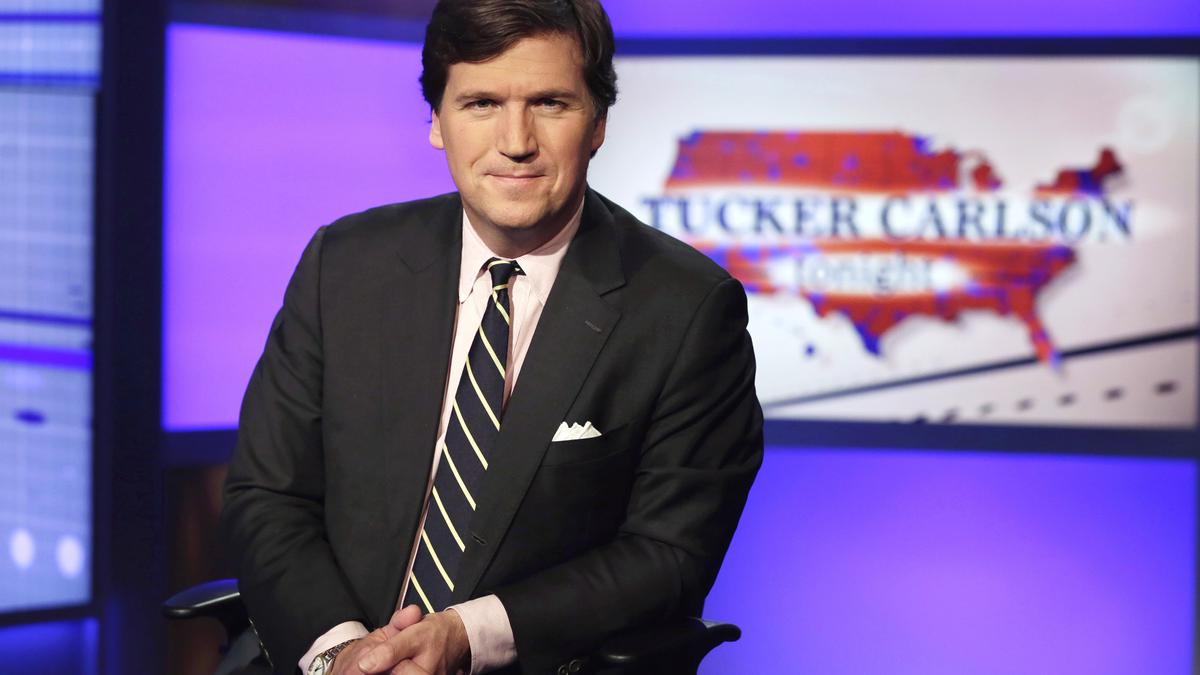Tucker Carlson at the Fox News channel studio in New York. File
| Photo Credit: AP
U.S. journalist Tucker Carlson, who lost his job at the right-wing platform Fox News after he dialled up criticism of the country’s foreign policy in the backdrop of Russia’s invasion of Ukraine, is making waves this week, by announcing his plans to interview Russian president Vladimir Putin, which no other U.S. platform would do. Mr. Carlson pointed out that endless interviews of Ukraine President Volodymyr Zelensky on multiple U.S. platforms were merely propaganda, “not journalism.”
At the Jaipur Literature Festival recently, the ‘Closing Debate’ was on whether free speech will survive surveillance technology and privacy invasions. While reflecting on how old surveillance and speech control was, a bit from World War I history came in handy for me. Woodrow Wilson, often celebrated as a progressive president, tried to control information when he decided to take the U.S. to the war. He started a Committee on Public Information, headed by a muckraking journalist, George Creel. It deployed an army of volunteers, called ‘four minute men’, who would appear at any place with a small gathering of people and deliver a four-minute propaganda speech. Wilson also outlawed criticism of the government under espionage and sedition acts, and the Supreme Court upheld it. At least 1,500 people were arrested; 400 periodicals were disallowed from using the postal services, which was also authorised to intercept mails.
Before free speech, there has to be free thought. Without free thought there is no free speech. Dominant groups try to control both thought and speech in a society. Thought is controlled by propaganda and speech by censorship. Various forms of propaganda and censorship have existed throughout history. But at no time have dominant groups acquired as much power as they have today, to control both thought and speech.
In democracies, there is more thought control than speech control. The more autocratic a society, the higher the proportion of control. When thought control becomes difficult, even democracies resort to speech control. If thought can be totally controlled, there is no reason to control speech. Everyone will amplify the values and thoughts that they share with everyone else. Antonio Gramsci theorised this relationship between the state, society, and institutions including the media, which creates a hegemony of groups and ideas. Coercion becomes less when hegemony is stronger. Digital media has upended this happy information ecosystem, and the U.S., like many other countries, is facing this crisis of hegemony. When argument losses power, power becomes the argument, and makers of alternative views are coerced out.
Mr. Carlson, supported by Elon Musk who has agreed to host Mr. Putin on X, is taking on the U.S. state, no less. This involves pushing back on propaganda and censorship. Make no mistake, what the Russian president would say is his own propaganda, but it will be a counter to the prevailing singular one. Mr. Musk’s adventurism has enabled it a platform, circumventing the unstated censorship that exists for it in the U.S.
However, another milestone achieved by Mr. Musk’s Neuralink raises a terrifying spectre for free speech. Neuralink has announced the successful development of a human brain extension that allows telepathic communication with a computer. It is being experimented in patients who lost limb mobility but have functioning brains. If technology can transmit thoughts in the brain to machines, it is possible that it can also carry thoughts from machines to the brain. At that point, the massive effort it takes to socialise people will become easier or unrequired.
Philosophers and science fiction creators have imagined such scenarios — for instance, in the Netflix series Black Mirror. Invasion of privacy in the future could be no longer about Peeping Toms, but implants that can farm thoughts. Pegasus might sound so stone age, soon. If we do end up in that future, speech will be totally free because thought will be totally controlled. Mr. Musk is apparently betting on both sides — absolute control and absolute free speech.
